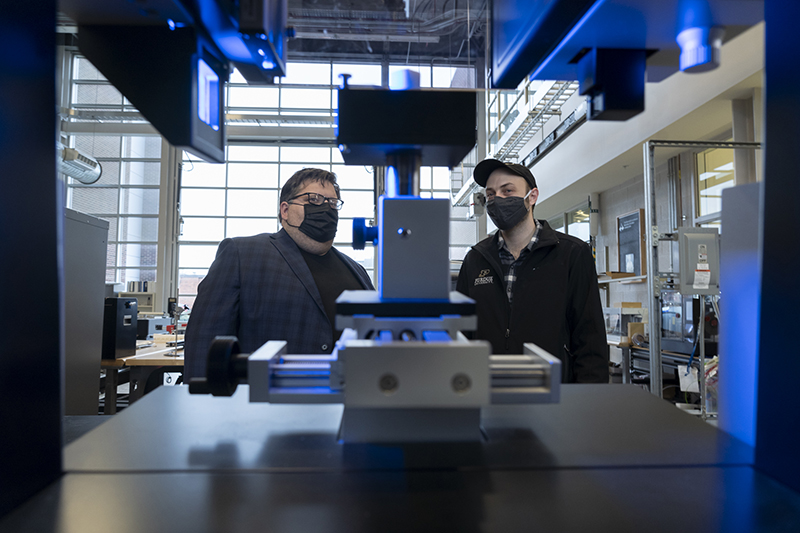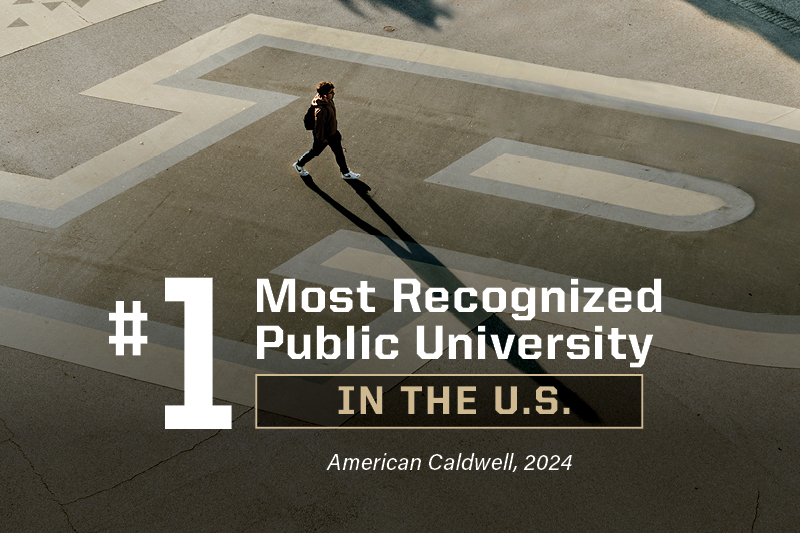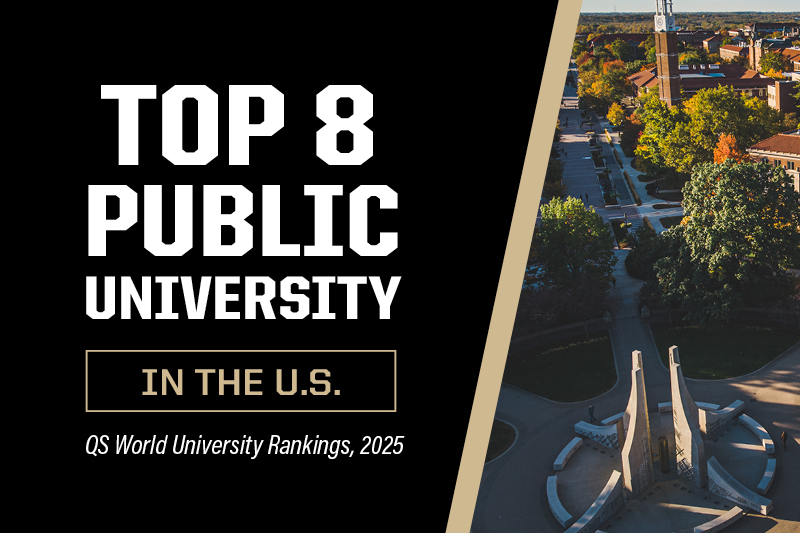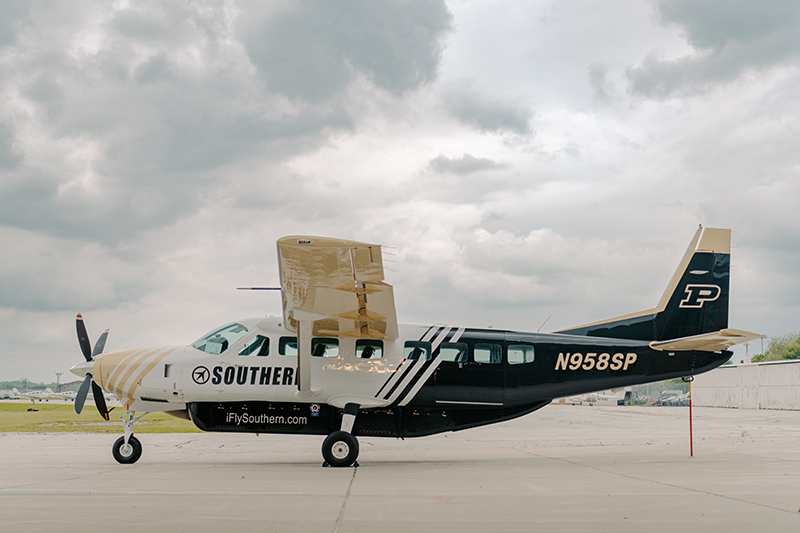Purdue tapped as lead for Midwest research hub of new Air Force program

Purdue researchers Jeffrey Rhoads and Bryce Geesey examine the surface properties of a mock solid rocket propellant at Purdue University’s Ray W. Herrick Laboratories. (Purdue University photo/Vincent Walter)
WEST LAFAYETTE, Ind. —
Purdue University will further research and development in critical areas of national security as a lead academic partner of a new pilot initiative with the Air Force Research Laboratory (AFRL).
Purdue was selected as the lead academic partner and headquarters for the AFRL Regional Research Hub – Midwest and will be involved in the development of a science and technology ecosystem across a wide area of 15 states — from Ohio, west to Kansas and Nebraska, and north to North Dakota. Included in the development of that ecosystem is the integration of additional partners, anticipated to span more than a dozen academic and 50 industrial partners from across the region and beyond.
Cornell University is the academic lead and headquarters for the other hub in the pilot initiative, the AFRL Regional Research Hub – Mid-Atlantic. Connectivity between these hubs will further the aims of the pilot initiative to advance technologies benefitting both defense and commercial markets, support innovative research and education, and aid in expanding collaboration and investment opportunities. The pilot initiative is funded for at least three years.
“Purdue’s selection to lead the new AFRL regional hub is a tribute to our faculty and researchers,” Daniels said. “Their scholarship and commitment to excellence make possible the university’s numerous partnerships in creating future technologies and protecting the national security.”
Purdue already has established excellence in key research areas considered critical to national security, including hypersonics and space systems, energetic materials and secure microelectronics. The areas, which are of interest to the Department of Defense, are among the critical topics under two of Purdue’s Next Moves, recently announced strategic initiatives that will advance the university’s competitive advantage. Earlier this month, Purdue announced the first Department of Defense contract for the new Purdue Applied Research Institute LLC, the applied research arm of the university. The contract establishes the Hypersonics Advanced Manufacturing Test Center, a single location at Purdue for industry partners to work with university researchers on developing high-temperature materials and creating new manufacturing processes to build and join these materials. This work will extend the capabilities of hypersonic vehicles, which is critical to U.S. leadership in the field.
Theresa Mayer, executive vice president for research and partnerships at Purdue, said that Purdue’s recent commitments to, and robust portfolio of, national security-related research and unique facilities and capabilities have made the university an attractive partner to the federal government, academic institutions, large and small businesses and investors.
“Purdue is increasingly working hand-in-hand with government, academic, and industry leaders to develop technologies, materials and solutions necessary to advance U.S. national security and competitiveness,” Mayer said. “We are eager to leverage those connections and our unique facilities and capabilities to drive technological innovation with AFRL.”
Purdue and AFRL officials are working to identify priority areas for research collaborations through the pilot program. Jeffrey Rhoads, director of Herrick Labs and Purdue University professor of mechanical engineering, said that Purdue and AFRL are treating the hub like a startup.
“With fresh, synergistic thinking and joint action with our partners across academia, industry and government, we will create an agile ecosystem that builds upon recent advancements and can respond at speed and scale to the increasingly complex national security landscape,” Rhoads said. “By having all partners in the technology supply chain from the onset, we have the ability to more rapidly transition critical technologies to the United States Air Force and Space Force, as well as commercial markets.”
Workforce development is an expected benefit of the pilot program, with AFRL expected to share technology innovations with students and faculty. That experience can bolster workforce opportunities at AFRL, partners within the hub collaborations and elsewhere.
Expansion of workforce opportunities aligns with existing projects, such as Scalable Asymmetric Lifecycle Engagement (SCALE), a workforce development program led by Purdue and funded by the Department of Defense that engages more than 70 academic, industrial, and governmental partners and is training students to be future experts in microelectronics areas.
The hub also will provide workforce development opportunities for AFRL scientists and engineers who may spend up to six months with regional partners working in technology problem spaces.
About Purdue University
Purdue University is a top public research institution developing practical solutions to today’s toughest challenges. Ranked in each of the last four years as one of the 10 Most Innovative universities in the United States by U.S. News & World Report, Purdue delivers world-changing research and out-of-this-world discovery. Committed to hands-on and online, real-world learning, Purdue offers a transformative education to all. Committed to affordability and accessibility, Purdue has frozen tuition and most fees at 2012-13 levels, enabling more students than ever to graduate debt-free. See how Purdue never stops in the persistent pursuit of the next giant leap at https://purdue.edu/.
Writer, Media contact: Brian Huchel, bhuchel@purdue.edu
Sources: Mitch Daniels
Theresa Mayer
Jeffrey Rhoads
Note to journalists:
An image is available on Google Drive. Journalists visiting campus should follow visitor health guidelines.



